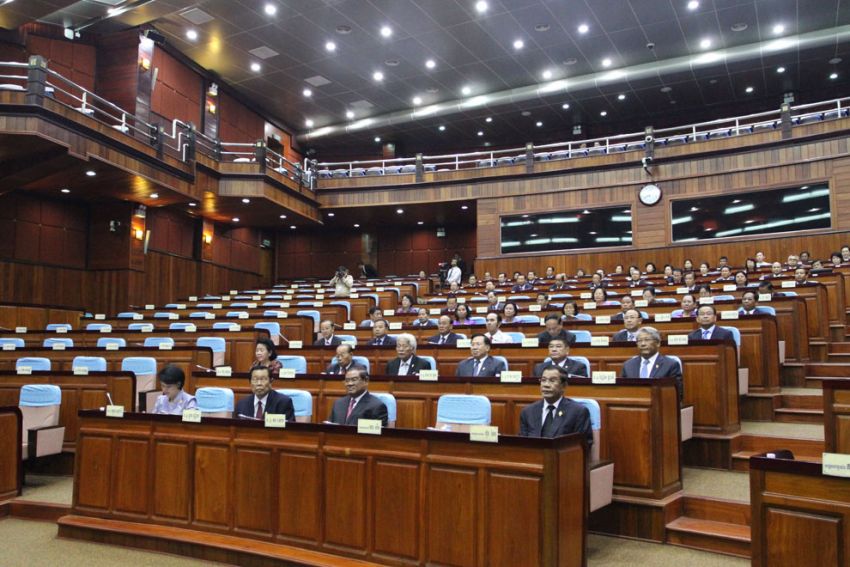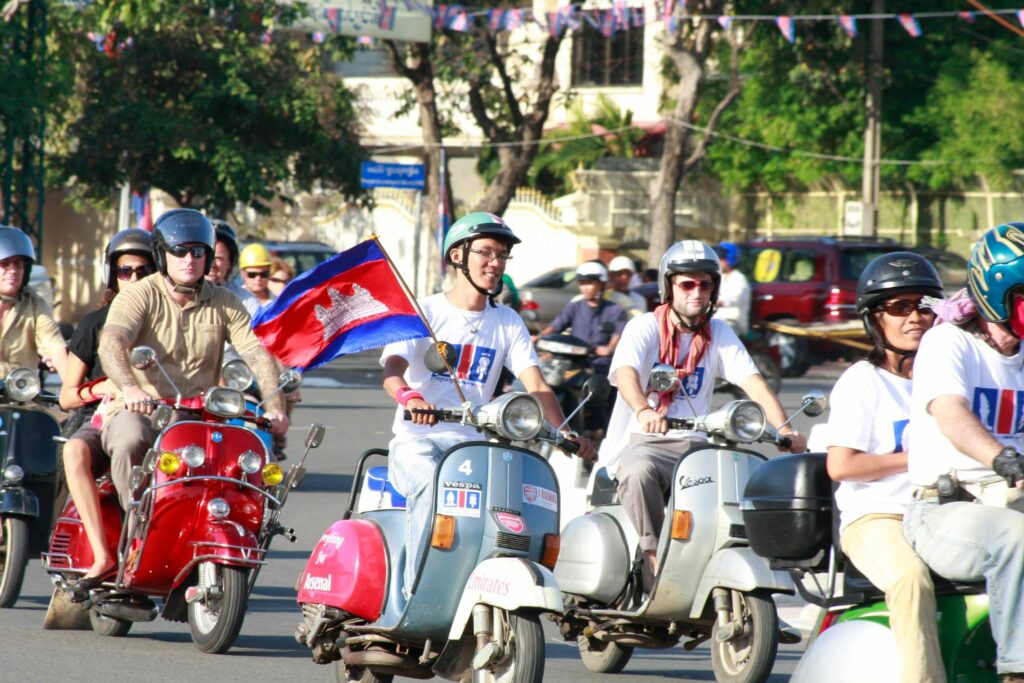Unofficial Translation from The Phnom Penh Post’s Khmer edition
TUESDAY, 27 MAY 2014,
TONG SOPRACH
ការផ្តល់យោបល់លើសេចក្តីព្រៀងច្បាប់គឺធ្វើឲ្យច្បាប់កាន់តែល្អប្រសើរ

Freedom of speech in Cambodia seem to be deteriorating while the tendencies of opposition and criticism to the government has increasingly emerged among people, ranging from the parliament member of opposition parties to the ordinary citizen, especially those who have suffered from the injustice, exploitation and oppression. These problems are the results of the poor drafting and enforcement of laws.
The suppression of political rights and freedoms in Cambodia tends to be complex and systematic. We can find such examples by just looking at the office buildings used for the implementation of legislative, executive, and judiciary policies. In the front of the former office building of National Assembly is a park, which is located in front of Botum Vatey Pagoda, and the protesters can use this garden as the place to gather and demonstrate.
However, the new National Assembly is connected to the main road by two streets and there is only a small garden in the middle of these paths. Moreover, the fence and the entrance, which surrounds the National Assembly, are so strongly built with two walls that it is difficult for protestors to break them. At the Senate, on the other hand, there is no space which the protesters can use to demonstrate. In front of the senate is Norodom Blvd. Around the office building of the Ministers’ Councils and the Peace Palace building stand fences, which are as tall as the walls that surrounded the fortress at Longvek.
“This condition allows no protester to enter the courtyard if the doors are closed as Prime Minister Hun Sen vetoed the first construction plan and held his officials responsible if protestors were able to breach the walls. As for the municipality court, if protesters want to demonstrate there, the only place they can assemble is the Olympic Stadium. Our leaders have copied-and-pasted the office building structure of the Assemblée National in Paris located in front of three boulevards, represent the repression of speech and freedom on demonstration. Obviously, these buildings leave no place or space for the protesters to gather and demonstrate. These reflect the narrow minds or mind-set of the leaders.
Based on my experience abroad, these kinds of buildings are open to the public in many countries and some of them are even open to tourists. The Palace of Westminster, at which the House of Commons is based, has a large yard which is big enough for a large group of people to gather and show condemnation of their rulers. In front of The Rajya Sabha (RS) or Council of States, the upper house of the Parliament of India, is a yard full of benches. The front courtyard of the Capitol in Washington D.C. has the capacity for at least a million people while the former House of Lords in Berlin, the base of the German parliament, is available for tourists to go in and explore the whole building.
As each related institution assures that it will protect and promote the constitution, the limitations in the process of law drafting and regulation have consequences on these supreme laws of state. For example, article 18 in the regulation of The National Assembly of Cambodia lays down that, “All the logs and documents, which are the properties of the National Assembly, have to be kept in the secretariat. Revealing them to the public or giving them to individual or group of individuals outside of the Assembly without the consent from the president of Assembly is not permitted.” This article, however, contradicts the third paragraph of article 83 stating that,”… In this case, the specific agenda of the extraordinary session has to be broadcasted to the people with the date of the meeting.”
This feature implies that the citizens have the right to be informed of all the actions through the live broadcast on televisions and the article in newspapers. Why is the restriction on gaining access to the Assembly’s logs and documents so serious while the broadcasting of extraordinary sessions is allowed? This restriction should only extend to materials which strongly affect national security.
The restriction on gaining access to the assembly’s logs and documents will have negative impacts on the interpretation and the enforcement of law, especially, in the judiciary, police and parliament. It will even lead to confusion and a public illusion among the MPs in terms of their ability to interpret the laws.
This condition will also give advantages to corrupt judges and lawyers. Once they are bribed, some judges may use legal ambiguities to reduce jail or prison sentences or allow the defendant to escape while remaining on bail. For instance, Mr. Cheam Yeab, an active Senior MP from the Cambodia People’s Party who has participated the formal discussion and debate over the making of many laws, was involved in a hit-and-run accident resulting in a fatality, but he managed to avoid prison sentences, for he had paid a large sum of money to the victim’s family. This case indicates the impunity of powerful and influential people in terms of law enforcement. Meanwhile, lawyers will use this situation to gain the benefit from both the plaintiff and the defendant. The ones who can afford to pay them more will be the winner. Here in Cambodia, if you are poor, you have to be ready to suffer from injustice and repression.
Therefore, the logs and documents are crucial to law enforcement officials since these records help them to get rid of any errors in the interpretation of laws. These records should be kept in the national library and published on the website of National Assembly.
Nonetheless, some MPs will intentionally interpret the laws in a skewed way in spite of the availability of Assembly logs and documents. For example, based on the constitutional council’s interpretation of Paragraph 1, Article 76 and Article 95 of the Constitutional Law on 22nd July, 2003, it was stated that, “The National Assembly must have at least 120 members. Here, it means that 120 members of the Assembly are required in order to be established for each term. The Election Laws do not allow the Assembly with less than 120 members to be created.”
Nevertheless, the current one-party Assembly comprises only 68 members, and it still has the authority to make and adopt the laws, even major ones. As you may recall, in the previous week, the Assembly adopted three contentious drafts of laws on the Judiciary’s independence, namely the law on the organization of court, the legal statute of judges and prosecutors, and the Law on the organizing and functioning of the Supreme Council of Judges.
Many NGOs and citizens have criticized this act as “the manifestation of Executive’s influence on the Judiciary”. Yet, Prime Minister Hun Sen mockingly responded to them by saying that he did not allow those civil societies to have any comment on the three laws. On the other hand, Mr. Yim Sovann, one of the MPs from the Cambodia National Rescue Party who has boycotted the Assembly, has shown his opposition to the adoption of these laws by claiming that if the opposition party had the power in the Assembly and in government, they would revise those laws. This encroachment of the executive on the judicial results from the lack of reconciliation between elected political parties in the Assembly and the restriction of the citizens’ freedom on speech and politics.
Moreover, according the theory of legislature, the laws, which are created with bias and injustice are not the real laws at all. In the previous week, why has Judiciary had to use the budget of the Ministry of Justice while the Executive and the Legislative have their own separate budgets?
In most developed countries, the governments have begun taking advice and comments from the public by providing them with access to their websites. In England, you can do that by going to http://www.parliament.uk. Next, you click on “Get Involved”, and the select “Have your say”, which will enable you to communicate with English MPs. This measure helps to save time and money; furthermore, those comments can be used in analytical studies to draw conclusions, and make decisions in accordance with the participation of the citizens, which is the basic tenet of democracy. In addition, each of the MPs in developed countries have around 10 legal experts as his or her assistants; in contrast to the MPs in Cambodia, many MPs have only one to carry documents, and a driver.
The National Assembly of Cambodia should be open-mined enough to take the lessons provided by developed democracies such as England as role models, and accept comments from the public in order to improve the quality of laws rather than restricting freedoms of speech and politics.
Tong Soprach is a social-affairs columnist for the Post’s Khmer edition.
Comments: [email protected]
